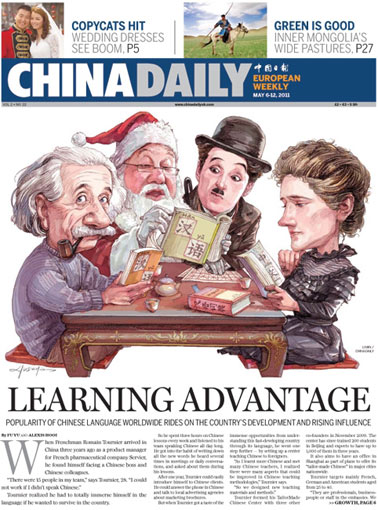People
Nuclear titan combats French peers and bias against women
Updated: 2011-05-08 07:49
By Steven Erlanger (New York Times)
|
In France, "you have the idea that if it's very serious, or it's a really attractive job, why not for a man?" Anne Lauvergeon Ed Alcock for The New York Times |
PARIS - Anne Lauvergeon is one of the most prominent female executives in Europe, and one of the most independent- minded - perhaps too much so for France's male-dominated elite. She is fighting for her job as head of one of France's largest nuclear enterprises, the largely state-owned Areva, and as usual here, the battle is as much personal as professional.
At the same time, the nuclear industry she represents is facing its largest challenge since the meltdown at Three Mile Island, and how the unfolding tragedy in Japan will affect her future is anyone's guess.
Known as Atomic Anne, Ms. Lauvergeon has an ambitious, global vision for Areva, which she constructed in 2001 as a merger of other French companies. Areva is engaged in nearly all aspects of nuclear energy, from mining and engineering to construction and recycling. Ms. Lauvergeon, 51, seeks outside investors and clients, while others want to impose more centralized control over Areva, and want her gone.
She is regularly listed by Forbes magazine as among the most important women in the world. "It's an advantage, but also an inconvenience," she said.
"It's strange, because being a woman is globally an advantage, especially in a very macho country, because you're very visible." But in France, she said, "you have the idea that if it's very serious, or it's a really attractive job, why not for a man?"
People say, "Yes, she's good, but she's not really an industrialist, because to be an industrialist you need to be - a man," she said, laughing.
Ms. Lauvergeon was born into a middle-class family in Dijon. She is married to a man who runs a small oil company; they have a daughter, 11, and a son, 7.
She had been a young star, an engineer who worked closely in her early 30s with the Socialist president François Mitterrand, becoming his representative for major international meetings.
President Nicolas Sarkozy was an early champion and asked her to join his new government. But Ms. Lauvergeon said that she wanted an industrial career, not a political one.
"He asked me, 'What do you want?' " She answered simply, but she told him, "I have what I want."
"It is true that it is not always easy to say 'no' to Mr. Sarkozy." But she did.
Time passes. "He wants to say 'no' to me now!" she said, laughing again. "It's a kind of revenge."
Her main rival is Henri Proglio, the chairman of the E.D.F. (ElectricitE de France), the world's largest producer of nuclear power and one of Areva's main customers. When he was appointed in November 2009, Mr. Proglio named himself "captain" of the French nuclear team and said that Areva should be dismantled.
But Areva is an international company, Ms. Lauvergeon argues, and E.D.F., which owns 2.2 percent of it, has gone from representing 80 percent of Areva's sales to 25 percent today. E.D.F. still likes to think of Areva "as its little dog," she said. "But we are independent and must stay independent."
While the world is already re-examining the safety of nuclear power, France depends upon it, with 77 percent of all electricity coming from nuclear reactors, which emit no carbon dioxide. Ms. Lauvergeon says Areva's newest reactor is much safer than the older ones in Japan, and it produces less waste. Two now being built in Europe have experienced costly delays and construction problems, and two are being built in China. But the market for safer reactors is likely to be strengthened by the Fukushima accident.
It's a risky time for Ms. Lauvergeon. Her term runs out in June, and she has powerful adversaries.
She must undergo a competition for reappointment; she said she welcomed the competition.
While she was recently described by the weekly Le Point as "cooked," she is considered to be in better shape now, partly because she is refusing to go quietly and partly because politics have shifted. It may also be, her intimates imply, that the government is a little bit afraid of her.
"I assure you," she said, laughing, "they can't strangle me in a dark corner!"
The New York Times
E-paper

War of the roses
European Chinese rose growers are beating their Chinese rivals at their own game
High-tech park gets big boost
At the source
Merchant of Venice
Specials

2011 Sino-US Dialogue
China and the United States will hold the third round of the Strategic and Economic Dialogue from May 9-10 in Washington.

High-tech park gets big boost
Zhongguancun sets sights on being one of the top technology hubs in the world

Learning to close the gap
Thousands of students have benefited from Tibet middle school program set up outside the autonomous region

